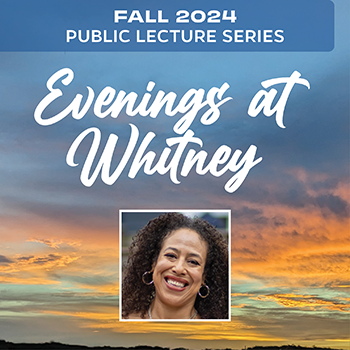
The University of Florida Whitney Laboratory for Marine Bioscience Evenings at Whitney Lecture Series continues Thursday, October 10, 2024, at 6 p.m. with the program titled “From one cell to many: multi-pronged approaches to understanding multicellular life”. Dr. Cassandra Extavour, Investigator, Howard Hughes Medical Institute, Timken Professor of Organismic and Evolutionary Biology and of Molecular and Cellular Biology, Harvard University, will be the speaker.
This free lecture will be presented in person at the UF Whitney Laboratory Lohman Auditorium, 9505 Ocean Shore Boulevard, in St. Augustine. Those interested also have the option of registering to watch via Zoom live the night of the lecture.
Register to watch online:
https://ufl.zoom.us/webinar/register/WN_anOPJOZvQCC-uuqg5nDsqA
Most complex life forms on earth, including animals and plants, are collectives of many cells all stuck together, where each group of cells performs specific functions. How these groups of cells form and maintain organs of the right shapes and sizes, is a long-standing problem for developmental biologists. This problem has been examined very effectively in a small number of animals that are easy to keep in the lab. However, this small number of organisms does not capture all of the amazing biological diversity seen in all of the species on earth. Furthermore, since all animals shared a last common ancestor, there must have been evolutionary changes in the ways cells organized themselves in ancestral species, that gave rise to the huge variation in cellular organizations and shapes that we see on earth today.
Dr. Extavour’s lab would like to understand how these variations in cell behaviours evolved, and to do this, they compare the cellular behaviours across multiple different organisms in their lab, including organisms that have not received much attention in laboratory studies before. Dr. Extavour will discuss examples from her lab where making nontraditional model systems suitable for quantitative cell biological methods has yielded new insights into the mechanisms and evolution of animal morphogenesis.
Dr. Cassandra Extavour is a native of Toronto, where she attended the University of Toronto Schools and went on to obtain an Honors BSc at the University of Toronto with a specialist in Molecular Genetics and Molecular Biology, a Major in Mathematics and a Minor in Spanish. She obtained her PhD with Antonio Garcia Bellido at the Severo Ochoa Center for Molecular Biology at the Autonomous University of Madrid. She performed postdoctoral work first with Michalis Averof at the Institute for Molecular Biology and Biotechnology in Crete, Greece, and subsequently with Michael Akam at the University of Cambridge. At Cambridge she received a BBSRC Research Grant and became a Research Associate in the Department of Zoology. In 2007 she established her independent laboratory as an Assistant Professor in the Department of Organismic and Evolutionary Biology at Harvard University, where she was promoted to Associate Professor in 2011 and to Full Professor in 2014. In 2021 she became a Howard Hughes Medical Institute Investigator, and was named the Timken Professor of Organismic and Evolutionary Biology and of Molecular and Cellular Biology at Harvard.